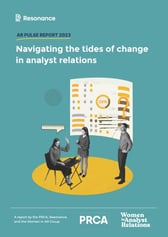3 min read
Beyond the Surface and Spin: Ensuring Trust through Authenticity and Action
Claire Williamson : Jul 18, 2023 3:40:00 PM
As PR professionals, our primary role extends far beyond telling resonant stories. We are here as the vanguard of truth and trust and reputation builders. Today, society expects more from brands. We - as citizens - are looking for equity, inclusion, environmental responsibility. Brands are pressed to respond, but too often that response is through cheap and empty words. The distinction between surface-level commitments and authentic actions is more critical than ever - not just because of reputation, but because doing the decent, right thing is important for society, particularly in a world defined by conflict and populism.
This blog explores our role in ensuring that the messages we communicate are not just words, but reflections of real, impactful actions.
The Responsibility of PR Professionals
As guardians of truth in the PR industry, we bear the responsibility of ensuring that the campaigns we champion are rooted in reality. This means rigorously assessing the claims we make or promote, particularly in sensitive areas like sustainability, racial equality, and gender parity. Our job is to guide and counsel our clients in aligning their public statements with measurable and impactful actions, steering clear of misleading practices such as greenwashing, whitewashing, and genderwashing. Brands that do this risk more than being found out, they create the problem of status quo, where progress is hindered through falsehoods.
The Thin Line Between PR and Reality
PR has the power to shape perceptions, but when used irresponsibly, it can lead to misleading practices like greenwashing, whitewashing, and genderwashing. These tactics involve making unsubstantiated claims to appear more environmentally friendly, racially inclusive, or supportive of gender equality, respectively, without any meaningful action backing them up. The role of PR professionals is critical here; they must guide their clients towards ensuring that their public commitments reflect true organisational commitment and change.
Examples of Misleading Practices
- Greenwashing: A company might release press statements about their commitment to sustainability, but a closer look reveals they continue practices harmful to the environment. Examples include Volkswagon cheating emissions tests and Innocent claiming their smoothies save the planet.
- Whitewashing: An organisation may tout diversity in its promotional materials, yet its leadership team lacks racial diversity, indicating a disconnect between public image and internal reality.
- Genderwashing: A brand might publicly support gender equality initiatives during events like International Women's Day, but fail to address gender pay gaps or lack female representation in its executive ranks. Japanese banks are currently under scrutiny for potential "gender washing" due to inconsistencies in reporting the number of women in management positions, as revealed by a regional bank survey. This situation raises concerns about the authenticity of gender diversity efforts in Japan's corporate sector.
How PRs avoid adding to the wave of washing
As PR professionals, we need to confront and combat the various forms of 'washing' practices - greenwashing, whitewashing, and genderwashing - where companies make misleading or unsubstantiated claims about their policies or practices in areas like environmental responsibility, racial diversity, or gender equality.
Educate and Counsel ClientsAct as a guide for your brands and leadership teams in understanding the importance of genuine commitments over superficial claims. Educate them about the long-term benefits of true sustainability, diversity, and equality initiatives, both for their reputation and their bottom line.
Foster Open Dialogue with StakeholdersBe a collaborative partner, enabling open communication with stakeholders and leaders in the business.
Conduct Thorough Research and AuditsStart by performing comprehensive audits of your brand’s policies and practices. This includes examining their environmental records, diversity reports, and gender-related policies. Ensure that your public statements are backed up by tangible actions and verifiable data.
Advocate for TransparencyEncourage your organisation to be transparent about their operations and initiatives. Transparency not only builds trust but also holds the company accountable. This means openly discussing both successes and areas for improvement in campaigns. Educate leaders that communicating areas for improvement sensitively and with a firm action plan increases trust.
Implement Continuous Monitoring and EvaluationSet up mechanisms for ongoing monitoring and evaluation of your organisation’s initiatives. Regular assessments help in keeping everyone accountable aligned with their stated commitments. Our role as PR professionals is not just to communicate, but to ensure that the communication is authentic. This involves setting measurable goals, tracking and reporting progress.
Develop Authentic NarrativesCraft narratives that accurately represent efforts and achievements. Avoid overstatements and ensure that any claims made can be substantiated. Authentic storytelling builds credibility and trust.
Promote Action-Oriented StrategiesEncourage action-oriented strategies. Instead of just making promises, they should be actively working towards achieving measurable goals in environmental sustainability, racial diversity, and gender equality.
Moving Towards Authenticity
As PR professionals, we must work with brands to ensure that any public relations efforts are not just press releases or thought leadership pieces but are backed by tangible actions. This means creating and implementing policies that genuinely promote environmental sustainability, racial equality, and gender parity. Public statements should be more than just words. They must be reflections of an organisation's true values and practices.
Measuring Impact
To avoid superficial commitments, it's essential to establish measurable goals and regularly assess progress. Setting clear targets for reducing carbon footprints, increasing diversity in hiring practices, or achieving pay equity can provide concrete benchmarks to gauge real progress.
Conclusion
As PR professionals, our job is not just to manage reputations, but to be stewards of truth, fostering trust between our clients and their stakeholders. In a world increasingly wary of hollow promises, our commitment to authenticity and transparency is crucial.



 "The intricacies of the data-driven landscape is written into the DNA of Resonance. We are built for the data economy."
"The intricacies of the data-driven landscape is written into the DNA of Resonance. We are built for the data economy.".jpeg?width=250&height=181&name=AdobeStock_565367297%20(1).jpeg)
 "In Tech PR we have a front row seat to the changing technology landscape. From Generative AI to Quantum, it's our job to insert our clients' voices into the narrative"
"In Tech PR we have a front row seat to the changing technology landscape. From Generative AI to Quantum, it's our job to insert our clients' voices into the narrative"



 "In a world where the only constant is change, how do tech brands stay one step ahead of the market? That's where Resonance comes in"
"In a world where the only constant is change, how do tech brands stay one step ahead of the market? That's where Resonance comes in".png?width=219&height=219&name=Seb%20Moss%20wavelength%20thumbnail%20(1).png)

 "Resonance is a group of technology, business and communications experts"
"Resonance is a group of technology, business and communications experts"

